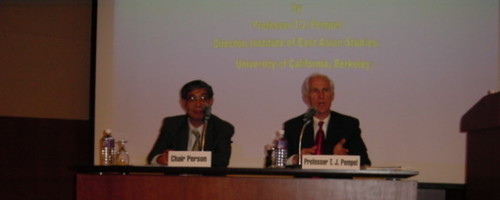Japan presents a frustrating political puzzle. The country has all the formal trappings of political democracy, including a free and frequently critical press; a diversity of densely organized and often competing interests; a party system that includes a multitude of independent, ideologically diverse and competitive political parties; and regularly held elections that by are any comparative measure relatively free and fair.
Yet, since Japan’s asset bubble burst in 1990, the country has been mired in a series of related economic problems that include slow-to-no GDP growth, rising unemployment and underemployment, declining productivity, a Nikkei at one-third its 1989 peak,extensive corporate bankruptcies, a huge swamp of non-performing bank loans, declining shares of world exports, the industrial world’s largest public sector debt burden, and plummeting foreign credit ratings to name but a few of the most prominent signals of economic torpor. Why has it taken Japan so long to deal with its economic problems? Why has the Japanese voting public continued to return to power the same political party that was in office when the collapse began and that has overseen most of the last decade of decline? T.J. Pempel will explore this puzzle of Japanese political economy and show how politics and economics have intersected in extending both economic sluggishness and LDP rule.
T.J. Pempel is the Director of the Institute of East Asian Studies at the University of California at Berkeley. Professor Pempel joined Berkeley’s Political Science Department in July 2001 and assumed the directorship of the Institute of East Asian Studies in January 2002.
His research and teaching focuses on comparative politics, political economy, contemporary Japan and Asian regionalism. His most recent book is a co-edited volume with Ellis S. Krauss entitled Beyond Bilateralism: U.S. ? Japan Relations in the New Asia-Pacific (Stanford University Press). Forthcoming in 2004 is an edited book entitled Remapping Asia: The Emergence of Regional Connectedness, with Cornell University Press. Other books include The Politics of the Asian Economic Crisis, Regime Shift: Comparative Dynamics of the Japanese Political Economy and Uncommon Democracies: Economic Development: Catalysts of Development, a jointly edited book sponsored by the World Bank (Oxford University Press). Earlier books include Policymaking in Contemporary Japan (Cornell University Press), Trading Technology: Europe and Japan in the Middle East (Praeger) and Policy and Politics in Japan: Creative Conservatism.
In addition, he has published over eighty articles and chapters in books, is on the editorial boards of several professional journals and serves on various committees of the American Political Science Association, the Association for Asian Studies and the Social Science Research Council. Previously he taught at the University of Washington at Seattle where he was the Boeing Professor of International Studies in the Jackson School of International Studies and an adjunct professor in Political Science, as well as Cornell University where he was also Director of Cornell’s East Asia Program. He has also been a faculty member at the University of Colorado and the University of Wisconsin. He teaches courses on the political economy of advanced industrial democracies; the political economy of development; and graduate courses in comparative political economy and political research methods. Professor Pempel received his PhD from Columbia University.



